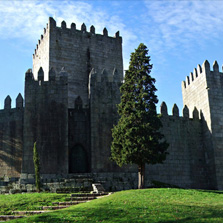Guimarães
 Guimarães is a Portuguese city located in the district of Braga, in the northern and sub-region of Ave (one of the most industrialised sub-regions in the country). It is a historical city, which played a crucial part in the foundation of Portugal as a country. Guimarães has existed for a millennium since it was founded, known then as Vimaranes. Guimarães is one of the most important historical cities in the country. The city centre was considered a Cultural Heritage of Humanity, turning it into one of the largest tourism centres in the region. Its streets and monuments breathe history and charm visitors. Guimarães has known how to best reconcile history and heritage conservation with dynamics and entrepreneurship, traits of a contemporary city. It is often named as the "Cradle-City", due to the fact that it was here that the administrative centre of the County of Portugal (Condado Portucalense) was founded by D. Henrique. His son, D. Afonso Henriques, is thought to have been born in Guimarães. Another historical event of importance was the Battle of São Mamede, which happened outside the city on the 24th of June 1128, an event that helped shape the concept of Portuguese nationality. However, the Reconquista and the need to protect territories further south led to moving the administrative centre to Coimbra, in 1129.
Guimarães is a Portuguese city located in the district of Braga, in the northern and sub-region of Ave (one of the most industrialised sub-regions in the country). It is a historical city, which played a crucial part in the foundation of Portugal as a country. Guimarães has existed for a millennium since it was founded, known then as Vimaranes. Guimarães is one of the most important historical cities in the country. The city centre was considered a Cultural Heritage of Humanity, turning it into one of the largest tourism centres in the region. Its streets and monuments breathe history and charm visitors. Guimarães has known how to best reconcile history and heritage conservation with dynamics and entrepreneurship, traits of a contemporary city. It is often named as the "Cradle-City", due to the fact that it was here that the administrative centre of the County of Portugal (Condado Portucalense) was founded by D. Henrique. His son, D. Afonso Henriques, is thought to have been born in Guimarães. Another historical event of importance was the Battle of São Mamede, which happened outside the city on the 24th of June 1128, an event that helped shape the concept of Portuguese nationality. However, the Reconquista and the need to protect territories further south led to moving the administrative centre to Coimbra, in 1129.
More info


